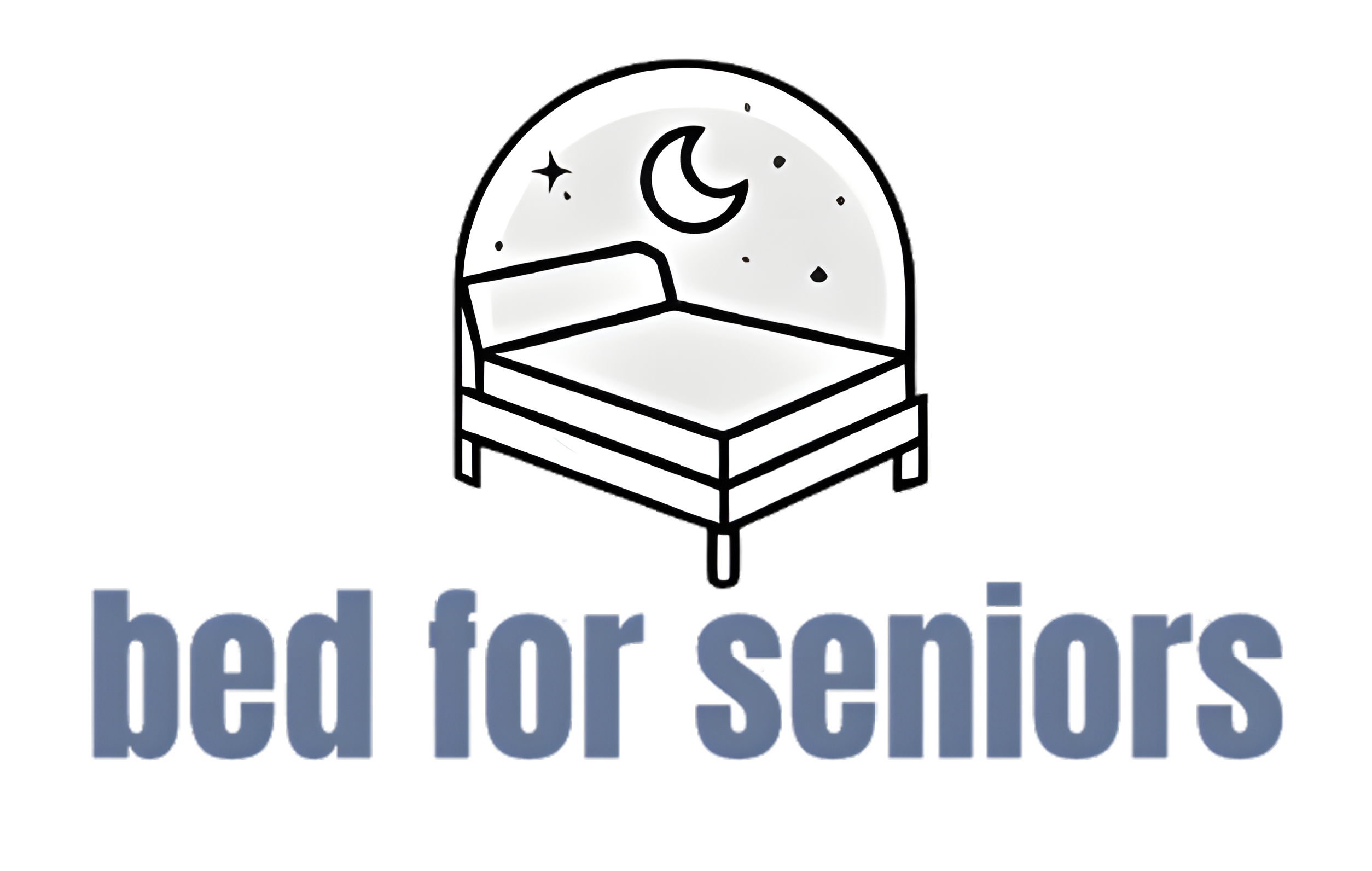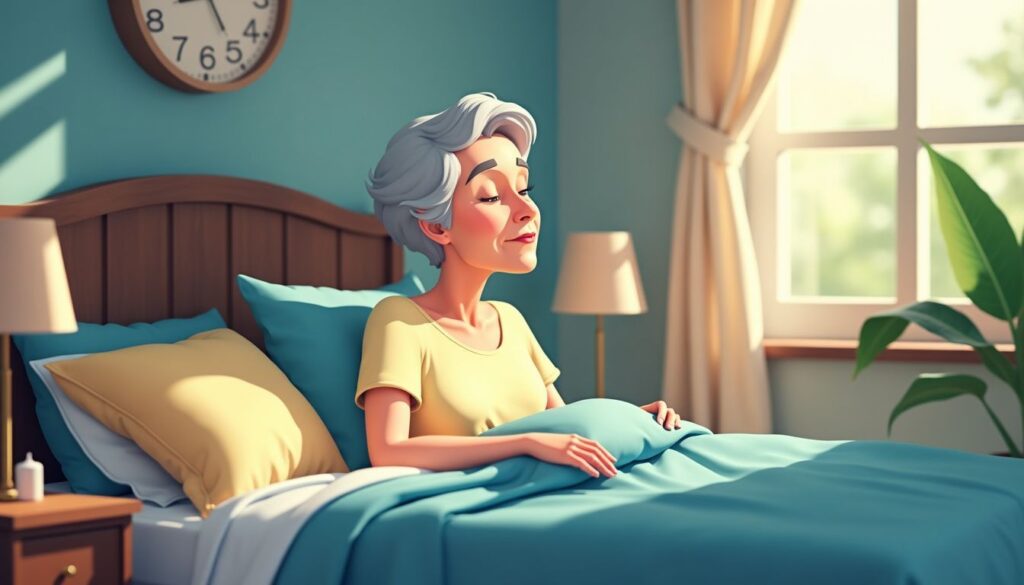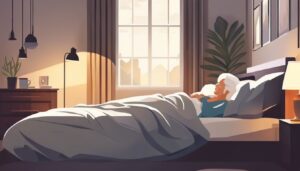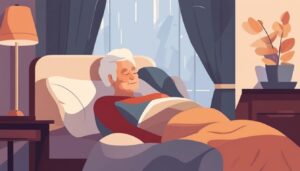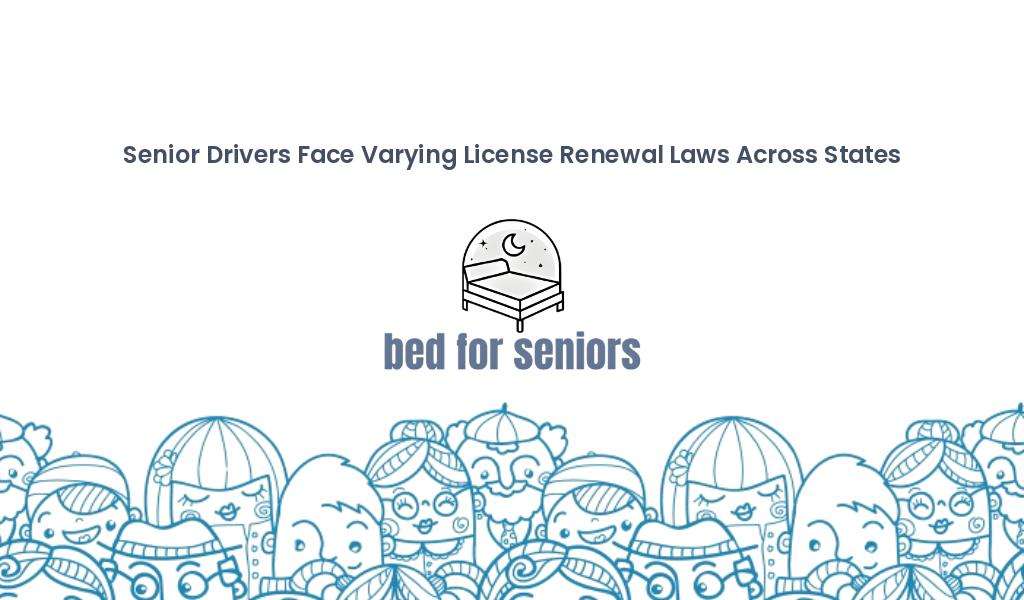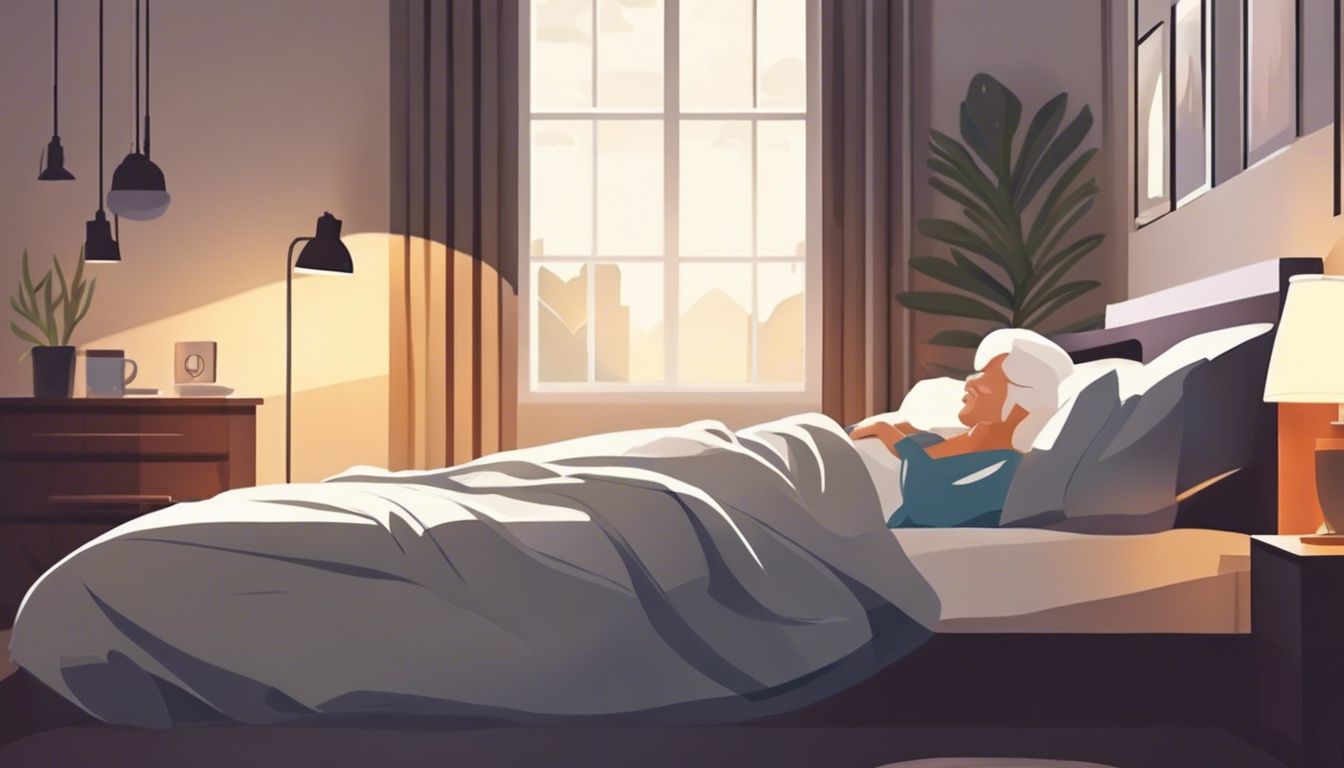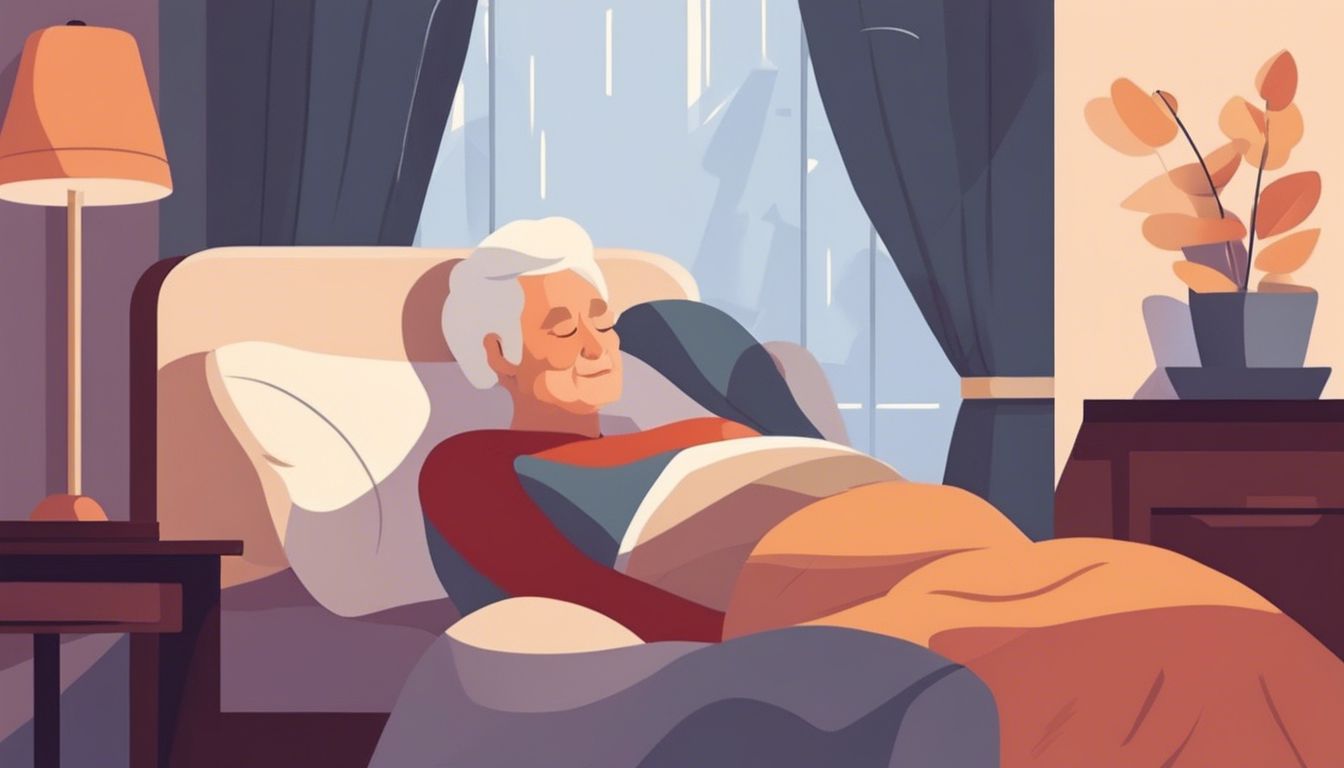Many seniors struggle to get good sleep at night. It’s a fact that improving sleep quality is possible with the right steps. This article will show you how to make your nights restful again, focusing on easy changes and tips.
Keep reading for better sleep tonight.
Key Takeaways
- Seniors need 7 to 9 hours of sleep each night. Sticking to a regular sleep schedule helps.
- Creating a good sleeping place means a dark, quiet, and cool room. Avoid screens before bed.
- Exercise like walking or yoga improves sleep. It’s best done in the day.
- Eating heavy meals late and drinking caffeine can make it hard to sleep. Choose light snacks instead.
- If troubles with sleeping don’t get better, seeing a doctor might be needed.
Understanding Sleep Challenges in Seniors

Sleep issues in older people often come from health problems like sleep apnea, restless legs, or even stress. Things like medicines and chronic conditions can also mess with their rest.
Causes of sleep disturbances
Many older adults have trouble sleeping. Poor sleep habits, health issues like depression or diabetes, and life changes can cause this. Certain medications also lead to fragmented sleep.
Not moving enough during the day plays a role as well. Then there’s conditions such as restless legs syndrome and sleep apnea that make it hard to stay asleep.
Changes in how we sleep as we age affect our rest too, but getting good sleep is still key for staying healthy—both physically and emotionally. So, about 1 in 3 American adults do not get enough deep rest each day.
This lack of sleep can hurt their daily life and overall well-being.
Impact of medications and health conditions
Health conditions and medications are big reasons why older adults often have trouble sleeping. For example, sleep disorders like sleep apnea and Restless Legs Syndrome (RLS) make it hard for them to get a good night’s rest.
These issues can wake them up often during the night.
Certain medicines also affect how well seniors sleep. Some drugs might keep them awake or cause them to wake up too early. Health problems such as heart disease and Alzheimer’s disease change their sleep patterns too.
It’s clear that managing these health conditions is key for better sleep in older adults.
How Much Sleep Do Seniors Need?
Seniors need seven to nine hours of sleep each night. Aging changes sleep patterns, making deep sleep harder to achieve. This can lead to more wake-ups during the night. Poor sleep harms health, raising risks for depression and memory problems.
It’s clear; sufficient rest is key for seniors’ well-being.
Practical Strategies for Better Sleep
Getting good rest can be tricky, but it’s not impossible. Simple steps like sticking to a sleep-wake cycle and making your room better for sleeping—think dark, quiet, and cool—can lead the way.
Establishing a consistent sleep schedule
A good sleep schedule sets the same bedtime and wake-up time every day. This helps set your body’s internal clock, making it easier to fall asleep at night and get up in the morning.
It is a key part of sleep hygiene. If you keep changing these times, it can make sleeping hard.
Start by picking a wake-up time that works for you every day, even on weekends. Stick to this time no matter how much you slept the night before. Over weeks, this will help improve your nightly rest cycle.
Also, avoid naps during the day as they can make it tough to sleep well at night.
Creating a sleep-conducive environment
After setting up a regular sleep-wake schedule, the next step is making sure the bedroom helps seniors sleep better. This means the room should be dark, quiet, and cool. Use blackout curtains to block light from outside.
If noise is a problem, try white noise machines or earplugs. The best temperature for sleeping is around 65 degrees Fahrenheit.
Make sure the bed is comfortable too. A good mattress and pillows can make a big difference in sleep quality. Also, keep TVs and computers out of the bedroom. Screens emit blue light that tells our brains it’s time to wake up, not sleep.
Finally, use soft lighting like dim lamps instead of bright overhead lights before bedtime to tell your body it’s time to rest.
Limiting caffeine and heavy meals before bedtime
Creating a place that helps sleep also means being careful with what seniors eat and drink close to bedtime. Cutting back on drinks like coffee and tea can make a big difference. These drinks have caffeine, which can keep them awake.
Also, eating big meals late can lead to discomfort and heartburn. Both of these issues can disturb sleep. So, it’s better to avoid heavy foods at least three hours before going to bed.
Instead, choosing light snacks if they’re hungry is a good idea. Good options could include crackers or a piece of fruit. This approach ensures their stomach isn’t upset, helping them relax for better sleep quality.
Role of Physical Activity
Moving your body helps you sleep better at night. Things like walking, swimming, or yoga improve rest. They make you tired in a good way and relax your mind. Start small, maybe with a short walk each day, and see how much better you can feel.
Keep going to learn more ways to help seniors get the rest they need.
Benefits of regular exercise on sleep
Regular exercise helps seniors sleep better. It boosts overall health, reducing stress and leading to deeper sleep stages. Physical activity during the day makes falling asleep easier at night.
It also cuts down on nighttime awakenings, making sleep more restful.
Exercise acts like a natural sleep aid without the need for pills. Seniors who stay active experience less daytime sleepiness and more consistent sleep patterns. Walking, swimming, or gentle yoga are great options.
They improve not just sleep but mental health too, tackling issues like worry and depression that can disturb rest.
When to Seek Professional Help
If sleep troubles don’t get better with home fixes, it’s time to see a doctor. Signs like constant tiredness or snoring loudly every night could mean a bigger health issue, needing expert advice from a sleep specialist or a general physician.
Identifying signs that require medical advice
Seniors need to watch for specific signs that mean it’s time to talk to a doctor about their sleep. Trouble breathing or long pauses in breath during sleep points to sleep apnea. This condition is serious and needs medical attention.
Another sign is feeling restless legs at night, making it hard to stay still. This could be Restless Legs Syndrome (RLS). Both conditions disrupt sleep deeply.
Also, if using sleep aids often doesn’t help, or health problems like arthritis cause pain at night, seek a doctor’s advice. Constantly waking up tired after a full night’s sleep suggests the quality of rest is poor.
Ignoring these symptoms can lead to more severe health issues over time. Quick action helps manage these disorders early on, improving overall health and well-being.
Conclusion
For better sleep, seniors must keep a regular bedtime and wake time. Avoid naps after 2 PM. Cut down on caffeine and big meals before bed. Regular walks or swims improve rest at night.
Try natural sleep aids like chamomile tea. If sleep troubles stay, see a doctor for advice. Simple steps lead to big changes in sleep quality for seniors.
FAQs
1. What are some common sleep problems seniors face?
Seniors often struggle with conditions like chronic insomnia, periodic limb movement disorder (PLMD), and obstructive sleep apnea, which can lead to inadequate rest and feeling tired.
2. How can relaxation techniques help improve the quality of sleep for older adults?
Relaxation techniques such as meditation can help manage stress levels, promoting better sleep patterns. They also contribute to a calming bedtime routine that signals the body it’s time for rest.
3. Can exercising aid in improving the quality of senior’s sleep?
Yes! Regular physical activity helps regulate circadian rhythms or our internal biological clock managed by suprachiasmatic nucleus (SCN). This aids in falling asleep faster and experiencing deeper stages of sleep.
4. How does poor-quality sleep affect seniors’ cognitive function?
Insufficient sleep disrupts cognitive function leading to issues like memory impairment and slower reaction times… It may even increase risks for conditions such as Alzheimer’s disease or other forms of dementia.
5. Are there any medical treatments available for severe cases of sleeping disorders among seniors?
Definitely! Treatments range from Cognitive-behavioral therapy (CBT) provided by a cognitive behavioral therapist to prescription medications… For certain disorders like obstructive sleep apnea, CPAP machines are recommended too!
6. Do lifestyle changes contribute towards combating sleeping difficulties in seniors?
Absolutely! Adopting healthy habits – maintaining regular sleeping patterns, creating an optimal environment for peaceful slumber, managing nighttime urination (nocturia)… All these steps work together to combat causes of insomnia and enhance overall health benefits including cardiovascular health.
